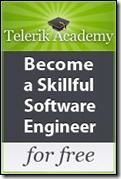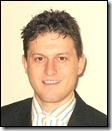Telerik School Academy
In the training department of Telerik Corporation we have a new project called Telerik School Academy.
 Telerik School Academy is an initiative for conducting a series of free trainings in software engineering with C# and .NET Framework for high school students, helping them to prepare themselves for the National IT Olympiad. The training events will be organized once monthly for 3 days in Sofia. The trainings are free, but the students’ expenses are supposed to be covered by themselves or by their school. Students are supposed to bring their own laptop for the practical exercises.
Telerik School Academy is an initiative for conducting a series of free trainings in software engineering with C# and .NET Framework for high school students, helping them to prepare themselves for the National IT Olympiad. The training events will be organized once monthly for 3 days in Sofia. The trainings are free, but the students’ expenses are supposed to be covered by themselves or by their school. Students are supposed to bring their own laptop for the practical exercises.
The learning objectives of the Telerik School Academy program cover the C# language, .NET Framework, databases and SQL server, ORM engines, Web applications development with ASP.NET and AJAX, desktop applications development with Windows Presentation Foundation (WPF) and RIA applications development with Silverlight. A special attention will be given to preparing for the IT Olympiad official technical test.
Preliminary Program
The course program focuses on data-driven Web, desktop and RIA applications development with C# 4.0, .NET Framework 4.0, Visual Studio 2010 and SQL Server 2008.
Meeting I – Introduction to C# Programming – November 2010
- Telerik School Academy – Introduction
- Sample Technical Test for Preparation for the IT Olympiad
- .NET Framework Overview – .NET, .NET Framework, CLR, MSIL, Assemblies, CTS, .NET languages
- C# Language Overview – Part I – Data Types, Operators, Expressions, Statements, Console I/O, Conditional Statements, Loops, Arrays, Methods
- C# Language Overview – Part II – Creating and Using Objects, Namespaces, Exceptions, Strings, Generics, Collections, Attributes, Lambda Expressions, Extension Methods and LINQ
- Object-Oriented Programming with C# – Defining Classes, Constructors, Properties, Static Members, Structures, Delegates and Events, Interfaces, Inheritance and Polymorphism
- Practical Project – Implementing an Algorithm for Playing the “Triple” Game (in teams)
Meeting II – Software Engineering and Team Working – December 2010
- Sample Technical Test for Preparation for the IT Olympiad
- High-Quality Programming Code – Naming Identifiers, Code Formatting, High-Quality Methods, Correctly Using Variables, Constants, Conditional Statements and Loops, Defensive Programming, Self-Documenting Code, Code Refactoring
- Software Engineering Fundamentals – Processes, Methodologies and Project Development Lifecycle, Project Plan, Analysis and Specification, Architecture and Design, Implementation, Testing, Deployment
- Source Control Systems and Team Working – Using TFS, SVN, TRAC, CodePlex, Google Code, etc.
- Figuring out a Project for the Olympiad – Thinking of Amazing Projects Capable to Make You a Winner at the Olympiad, Good and Bad Projects, Discussing the Available Ideas for Projects
- Setting-Up Teams and Projects – Setting-up Project Teams and Team Working Environments
- Projects Mentoring – Assisting the Students in Creating their Projects for the Olympiad, Choosing the Most Appropriate Technologies, Planning the Projects, etc.
Meeting III – Databases, SQL Server and ORM Engines – January 2011
- Sample Technical Test for Preparation for the IT Olympiad
- Databases, SQL and MS SQL Server – RDBMS, SQL Language, SQL SELECT, Joins, Aggregate Functions, Grouping, SQL INSERT, SQL UPDATE, SQL DELETE, MS SQL Server, SQL Server Management Studio
- LINQ and LINQ-to-SQL – LINQ Operators and Expressions, Projections, Conversions, Aggregations, LINQ-to-SQL, Visual Studio LINQ-to-SQL Designer, Using DataContext to Read / Create / Update / Delete Data, Joins, Avoiding the N+1 Query Problem, Native Queries
- Practical Project – Implementing a Database Processing Application in C# with LINQ-to-SQL (in teams)
Meeting IV – HTML and Web Technologies – February 2011
- Sample Technical Test for Preparation for the IT Olympiad
- Web Technologies Basics – HTTP and WWW
- HTML Basics – HTML, Text, Images, Tables, Forms
- CSS basics – Creating and using CSS styles, Using Firebug and IE Developer Toolbar
- JavaScript Basics – JavaScript Syntax, Accessing the DOM Tree by JavaScript
- Practical Project – Creating a Web Site by Web Design Given as Image – Slice and Dice (in teams)
Meeting V – ASP.NET and AJAX – March 2011
- Sample Technical Test for Preparation for the IT Olympiad
- ASP.NET – Part I – ASP.NET Web Forms, Code Behind Pages, Page Execution Model, Web Server Controls, HTML Server Controls, Creating Simple Web Applications
- ASP.NET – Part II – Data Binding and Data-Bound Controls: Data Sources (LinqDataSource, ObjectDataSource), GridView, FormView, DetailsView, DataList, Repeater, ListView, Pager
- ASP.NET – Part III – Session and State Management, Master Pages and Navigation, User Controls, Web.config, ASP.NET Membership, IIS and Deployment
- ASP.NET AJAX – ScriptManager, UpdatePanel, AJAX Control Toolkit
- Practical Project – Creating a Data-Driven ASP.NET Web Application (in teams)
Meeting VI – Windows Presentation Foundation (WPF) – April 2011
- Sample Technical Test for Preparation for the IT Olympiad
- WPF Basics – Introduction to WPF and XAML, XAML Text and Graphics, Basic WPF Controls
- WPF Data Binding – Data Contexts, the Declarative Binding Syntax, Data-Bound Controls (Lists, Grids, etc.)
- Creating Data-Driven WPF Applications – Integrating LINQ-to-SQL and WPF, Implementing CRUD Operations, Master-Detail Navigation
- Practical Project – Creating a Data-Driven WPF Application (in teams)
Meeting VII – Silverlight – May 2011
- Sample Technical Test for Preparation for the IT Olympiad
- Silverlight Basics – Introduction to Rich Internet Applications (RIA) and Silverlight, the Model of Synchronous Programming in Silverlight, Basic Silverlight Controls
- WCF RIA Services – Accessing External Data and Databases from Silverlight
- Creating Data-Driven Silverlight Applications – Integrating LINQ-to-SQL and Silverlight with RIA Services, Implementing CRUD Operations, Master-Detail Navigation
- Practical Project – Creating a Data-Driven Silverlight Application (in teams)
Meeting VIII – Preparation for the IT Olympiad – May 2011
- Sample Technical Test for Preparation for the IT Olympiad
- Projects Mentoring – Assisting the Students in Creating their Projects for the Olympiad, Making the Projects to Complain to the Official Olympiad Requirements
- Presentation Skills – Developing Presentation Skills; Preparing Good Presentations for the Olympiad
Notes
All teaching materials (lectures, presentations, examples, demonstrations, exercises, etc.) will be available for free download. All lectures and discussions will be recorded and the videos will be available for free download.
The Trainers
The trainers at Telerik School Academy are skillful .NET software engineers working at Telerik. The team is leaded by the Telerik Academy principal trainer Dr. Svetlin Nakov.
About Svetlin Nakov
 Dr. Svetlin Nakov has over 15 years of technical background as software engineer, project manager, consultant, trainer, and entrepreneur with rich experience with the .NET and Java EE platforms, information systems, databases, Web development and information security. He is author of few technical books about .NET, and Java programming, and tens of technical and scientific publications. Svetlin Nakov is a regular speaker at hundreds of conferences, seminars, courses and other trainings and holds a PhD degree in computer science. He is the principal trainer at Telerik Academy, a former member of the jury of the National IT Olympiad and now is the leading organizer of the Telerik School Academy project.
Dr. Svetlin Nakov has over 15 years of technical background as software engineer, project manager, consultant, trainer, and entrepreneur with rich experience with the .NET and Java EE platforms, information systems, databases, Web development and information security. He is author of few technical books about .NET, and Java programming, and tens of technical and scientific publications. Svetlin Nakov is a regular speaker at hundreds of conferences, seminars, courses and other trainings and holds a PhD degree in computer science. He is the principal trainer at Telerik Academy, a former member of the jury of the National IT Olympiad and now is the leading organizer of the Telerik School Academy project.
Requirements for the Participants
All participants should be strongly motivated high school students with keen interest in computer programming. Minimal requirements:
High school students only. The training program is for Bulgarian high school students only. School teachers could be accepted as an exception when excessive vacancies are available.
Technical English. The training sessions will be held in Bulgarian but all the training materials (lectures, examples, demonstrations, exercises, etc.) will be in English.
Basic computer programming skills. Participants are supposed to have basic computer programming skills in some language (e.g. C++, Pascal, Java, C#, PHP or other) and to know how to work with variables, arrays, conditional statement, loop, basic data structures, etc.
Strong desire to learn computer programming. Only highly motivated students will be accepted to visit the free trainings.
How to Join?
To join the Telerik School Academy community please subscribe to the official discussion group: http://groups.google.bg/group/it-olymp. All upcoming events will be announced through internal group invitations.
Official Web Site
The official Web site of the Telerik School Academy project is coming soon.

2 Responses to “Telerik School Academy”
Been going through the english version of this book but have been stuck waiting for chapter 7 to be completed. Do you expect this chapter to be done anytime soon? It says doc for the extension, but it is a zip file. All that is included in the zip file are some xml files.
ignore my previous comment… just changed the zip to docx extension